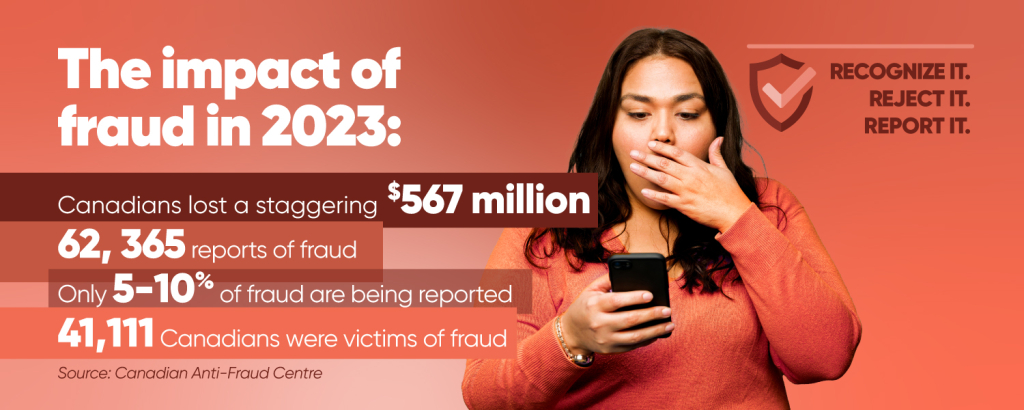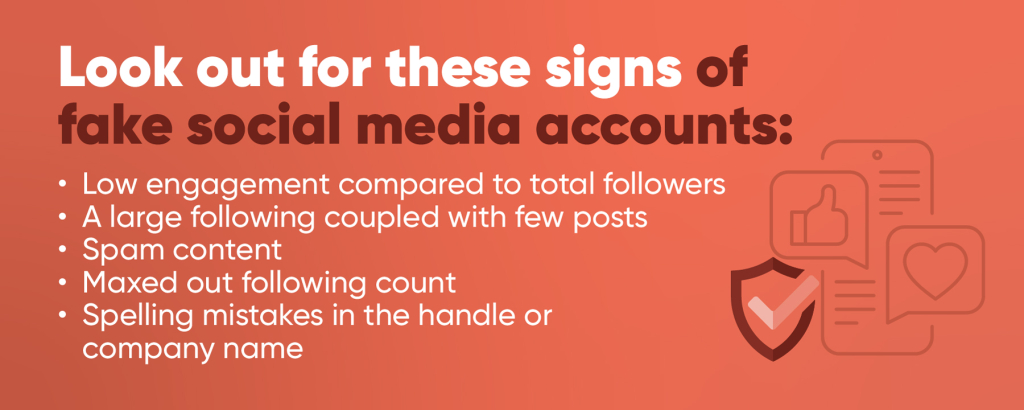Posted: March 20, 2024 by Kat Attwell in Money tips, Protect, cryptocurrency, cybersecurity, fraud, fraud prevention month, March Fraud Prevention, scams
Protect yourself against the top scams and fraud in 2024
March is Fraud Prevention Month, and we’re examining some of the top scams Canadians need to be aware of this year.
According to the Canadian Anti-Fraud Centre, social media is increasingly a site for fraudulent activity and investment scams remain a concern, with new tricks like QR codes being weaponized to persuade victims to deposit money in fake accounts.

Here is a list of the most common scams in 2024 and how you can protect yourself from them.
1. Investment scams
In 2023, the CAFC noticed an increase in romance and investment scams. These involve gaining a victim’s trust and persuading them to participate in a get-rich-quick scheme via cryptocurrency investments.
Fake online trading platforms can be very convincing, leading victims to transfer funds or cryptocurrency into the fraudster’s trading account. In most cases, victims only realize they have been defrauded when they are unable to withdraw their funds.
Always be suspicious of:
- Unsolicited investment opportunities (even from friends and family)
- Higher-than-normal returns on your investments
- High-pressure tactics
- Cryptocurrency websites
- Requests for cryptocurrency payments

How to protect yourself from investment scams:
Always be highly suspicious of unsolicited email seriously. If you do decide to respond, though, never rely on the websites and phone numbers included in unsolicited information. Do a web search on the investment being offered to check if any scam alerts come up. Better yet, verify the investment with your provincial/territorial securities regulators, such as the Manitoba Securities Commission.
2. Social media scams
In the digital age, it’s common to connect with people we’ve never met in person — something scammers frequently take advantage of. It’s easy to pose as an acquaintance online and ask a small favour, which could then lead to identity theft and stolen passwords.
Another common scam on social media is false advertising. Be cautious of ads that promise job opportunities, discounted merchandise or free trials. When interacting with accounts, look for signs that they aren’t owned by a real person.
Characteristics of fake accounts include low engagement, spam content, spelling mistakes and a large following coupled with few posts. You should also do a Google search of the product and company name before engaging further — you may find other social media posts or reviews that help determine if the company is legitimate or not.
Protect yourself from social media scams:
A common tactic used in social media schemes is false advertising. Look out for anything that appears too good to be true, such as free trials, discounted merchandise and incredible job opportunities. Be wary of fake accounts, which are a red flag for scams.

Remember, when scammers gain access to your social media profile, they also gain access to all the information associated with it, such as passwords and other sensitive data. This can be used for:
- blackmail
- identity theft
- publishing fake ads
- targeting others on your contact list

Don’t fall victim to these 5 types of fraud
3. Spear phishing scams
Be aware of texts and email messages, which appear to be from a legitimate source, that say someone is trying to access your account. Never respond to the text or email, and do not click on any links.
In the fall of 2023, the CAFC reported phishing texts claiming to offer the Climate Action Incentive Benefit. However, be aware. Although this is a legitimate benefit offered to many Canadians, the government will never send you links via text for you to claim money.
The golden rule is that if you’re unsure, don’t click. Opening a fraudulent link can potentially infect your device or compromise your data. Instead, reach out to the government agency directly by looking up their official contact information.
What should you do?
If you’re concerned about these messages, especially if they are ongoing, call your financial institution directly to find out if they’re trying to get in touch with you.
4. Merchandising scams
Whether you are selling or buying, merchandising scams can trick even the savviest shopper. These schemes aim to trick people who are buying or selling goods online.
For instance, fraudulent QR codes can be used to steal your personal information. They function similarly to deceptive links or URLs, and once inserted in emails and texts can be very difficult to detect. Once scanned, they direct potential victims to fraudulent or malicious websites.
When it comes to online transactions, be on the alert if someone sends you a cheque for more than the agreed amount. Likewise, if there’s a sense of urgency from the other party that seems unreasonable, you might be better off walking away. The golden rule applies here: if it’s too good to be true, it’s likely a scam.
Spot the warning signs and protect yourself from merchandising scams:
- People who are not “authorized” sellers
- Spelling mistakes in the web address and on the website
- Blowout sales or greatly reduced ticket prices
- Unknown fees involved
- Company’s contact information (address, phone number, email) should be verifiable

5. Employment scams
The Canadian Anti-Fraud Centre reports a rise in scams targeting people looking for a job, with increasingly sophisticated methods, from unsolicited email offers to fake hiring managers “working” for prominent companies on LinkedIn.
A job offer may be followed up with a cheque to set up a home office, and a request to wire transfer money to an office equipment retailer. As in the recent case of a Toronto man, it’s all part of an elaborate plot to raid bank accounts.
Other common fraudulent employment schemes include:
- Instagram DMs that claim someone received your resume through a job posting site and is interested in hiring you. It is common for scammers to ask for personal details, financial information and even pretend to send you an advance ‘digital payment.’ However, after you deposit the money, you’ll get a call from your financial institution that the cheque was counterfeit.
- An offer to participate in “car wrapping,” or wrapping your vehicle with a logo. Fraudulent cheques are offered as compensation, and victims are asked to deposit the funds in a bank account to pay for graphics—only to learn the cheque bounced and they are on the hook for the money.
- Getting hired as a “Financial Agent” to process invoices for a client. This can be a front for a money laundering plot involving cryptocurrency.
- Receiving a notice that you’ve been selected as a mystery shopper or personal assistant. A cheque and instructions to transfer a large portion of the money into another account follows. Commonly, customer experience surveys are sent out to make the job appear more legitimate.
Here’s how to defend yourself against employment scams
- Practice healthy skepticism: Be wary of any offer that seems “to good to be true”
- Do your research: Look online for contact information for the company that supposedly reached out, and get in touch to confirm
- Beware of requests to transfer funds: Legitimate employers will not ask you to write cheques or send wire transfers
By being aware of the latest scams and fraud prevention tips, you’ll be in a better position to outwit the fraudsters. But if you think you might have been scammed, don’t be afraid to speak up and report it.
Don’t forget tax scams
During tax season, expect an increase in fraudsters posing as Canada Revenue Agency or Service Canada employees. They may claim that you have a compromised SIN number, an outstanding case against you, owe back taxes, have unpaid balances or have even committed a financial crime.
The fraudsters may threaten that if you do not speak to them immediately, you’ll be arrested, fined or deported. They may also request payment via money service businesses, prepaid cards and gift cards (iTunes, Google Play or Steam cards) or even Bitcoin. While this can be shocking and scary, do not take the bait.
Remember, the CRA will never request payment through any of these methods, and it is fully within your rights to hang up and verify any of these claims by calling the CRA directly.
Armed with this knowledge and ready to proactively avoid the scammers, you’ll be safer online. To get extra protection, learn about SIM swaps and how to prevent smartphone fraud. Then explore these 17 tips to protect your ACU account from online fraud.
Stay smart and get ahead of the scammers this Fraud Prevention Month.
Up Next
Community stories
Read more ›
Sustainability: How ACU is turning words into action
A hand holding a seedling
Advice/Perspectives, Community stories
Read more ›
For ACU, Pride radiates outward
“I’ve always wanted to instill a change in the world for the better,” says Cristina McCourt, Financial Account Manager Trainee and member of the ACU Pride Committee, an employee-led resource…
Advice/Perspectives, Borrow, Business growth
Read more ›
Royal Aviation Museum travels to its final destination—with ACU’s help
A stone’s throw from the main terminal of Winnipeg Richardson International Airport you’ll find one of Canada’s hidden gems, where the airplanes are a little more exciting than your typical…




